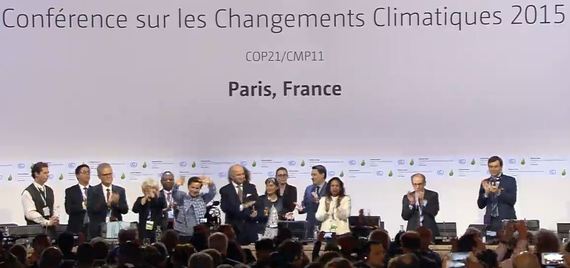
As the world digests the historic global climate agreement reached by negotiators in Paris, here's one thing that's clear:
The agreement -- coupled with the tremendous groundswell of action by investors, businesses and world leaders over the past two weeks -- sends a clear market signal that the next phase of the clean energy revolution has begun.
Members of the U.S. Congress who insist on remaining stuck in the fossil-fuel past now seem little different than the entrenched monarchy during that other revolution in France nearly 225 years ago, when King Louis XVI and his court refused to acknowledge the change their people demanded.
Policy -- whether at the state level or the global level -- drives action, and businesses are taking it. Consider what we witnessed in Paris over the last two weeks:
*More than 500 institutions representing $3.4 trillion in assets -- institutions ranging from California's biggest pension funds to Europe's biggest insurance company -- have agreed to divest their fossil fuel holdings. Look for much of that money to start flowing into clean energy.
*Microsoft Corp. founder Bill Gates announced a new fund that will invest billions of dollars in clean energy research and development over the next five years. In addition, the United States and 19 other countries will invest even more on clean energy R&D, for a total of $20 billion over the next five years.
*Hundreds of companies big and small announced plans to take action to reduce their greenhouse gas emissions and increase their use of renewable energy. In the United States, more than 150 U.S. companies with a combined market capitalization of over $7 trillion laid out the details of their plans in the White House American Business Act on Climate pledge. About 500 more companies around the globe made similar pledges through the We Mean Business Coalition.
We've never seen this sort of action on climate change by the businesses that drive the world's economy.
It's simply tremendous.
What's motivating captains of industry, from icons like Bill Gates to small and mid-size business owners like Troy Van Beek and Geoff Chapin, is the clear realization of both the economic impacts and the economic opportunities that come with climate change.
Incomes in most countries will fall dramatically if climate change continues unchecked, according to Stanford University researchers.
In the United States, millions of homes and businesses along the nation's coasts could be destroyed by storms and sea level rise; agricultural communities could be wiped out, and construction and tourism industries could be thrown into turmoil, according to last year's seminal Risky Business report.
Already, annual economic losses from weather-related disasters has risen from about $50 billion in the 1980s to almost $200 billion over the last decade, research from the World Bank and insurer Munich RE shows.
Conversely, the economic opportunities of dealing with climate change are positively huge.
Last year, more than $270 billion was invested in clean energy around the world, according to the United Nations Environment Programme and Bloomberg New Energy Finance.
In the United States, more than 250,000 clean energy and clean transportation jobs have been announced in every state in the country in the past three years alone, our research at Environmental Entrepreneurs (E2) shows.
And for an idea of the economic benefits that come with energy efficiency, consider just one state -- California -- where businesses and consumers have saved more than $90 billion on utility bills and hundreds of thousands of energy efficiency jobs have been created, thanks to smart state policies.
The agreement forged in Paris will drive more investments in renewable energy and energy efficiency. It will create new investment sources for clean energy companies and entrepreneurs. And it will help to mitigate the growing economic impacts of climate change.
All of that will keep the clean energy revolution going. And that's good for our economy and good for environment.

